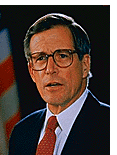 The people support offshore oil exploration. The politicians should listen.
The people support offshore oil exploration. The politicians should listen.
Commentary by Pete du Pont
May 17, 2010
Source: Wall Street Journal
The amount of energy America’s economy consumes is rising, and oil is a significant portion of its generation. But the domestic production of American oil is falling, and that means that imports must increase each year, which is why increasing the amount of our offshore drilling is a critical component of our energy future.
But on April 20 an oil rig explosion in the Gulf of Mexico caused a leak of about 210,000 gallons a daynearly five million gallons by nowinto the ocean, and it may be several weeks or longer before it is capped and the leakage controlled. The current Gulf spillage is already almost half of the spillage from the 1989 Exxon Valdez oil spill off the coast of Alaska which amounted to about 11 million gallons, so it is a serious pollution problem.
The explosion has emboldened those who want America to stop drilling for oil and other petroleum products. But it is important that policy makers in Washington resist their callsfirst, because if we do not obtain oil our economy will suffer, and second, because overall industry spills are kept at a very low amount. The Mineral Management Service two years ago calculated that only about one barrel is spilled for every 157,000 produced, a rate of less than 0.001%.
The cause of the explosion needs to be understood so that we can improve the thousands of other platforms we have off the coast of America, to make sure they do not explode, kill workers and pollute our coastal waters.
But we need to increase the quantity of America’s oil production so that we can energize our growing country and reduce the importation of foreign oil. Our nation’s total energy requirementsoil, coal, natural gas, electricityare increasing. From 1980 to 2008, America’s annual energy usage increased from 78 quadrillion to 99 quadrillion British thermal units. It is estimated to increase to 111 quadrillion BTUs by 2030.
Yet while energy needs are increasing, annual domestic oil production is declining, from 3.1 billion barrels in 1980 to 1.8 billion in 2008. To make up for these decreases, we have dramatically increased imports, from 483 million barrels in 1970 to 1.9 billion in 1980 and 3.6 billion in 2008. Back in 1970, U.S. oil production accounted for 88% of our consumption, while today it is only 34%. Imports now account for just under two thirds of the oil we use. More than one-quarter of our foreign oil comes from two potentially unstable countries: Saudi Arabia (15%) and Venezuela (11%).
So there is no question that America needs to drill for more oil, both onshore and offshore. Unfortunately some of environmental organizations, including the Sierra Club and World Wildlife Foundation, want to curtail offshore drilling. Sen. Bill Nelson (D., Fla.) is introducing legislation that would halt currently planned offshore drilling expansion on America’s Outer Continental Shelf, and Sen. Barbara Boxer (D., Calif.) wants to ban it off of California’s coast. The White House is thinking about that sort of policy change too.
Shutting down offshore oil drilling would seriously hurt our economy, and not just from the lost jobs directly and indirectly attached to offshore exploration and production. Oil is the lifeblood of our economy. Limiting or reducing a significant portion of our homegrown oil supply would be both an economic setback and a national security risk.
Our oil situation is analogous to where we stand with electricity, where we are decades away from significant supplies from solar power, wind turbines or totally clean coal. Hybrid and plug-in technology (really battery technology), has vastly improved automobile mileage, and useful transportation alternatives will someday be with us, but not soon enough to immediately diminish our need for further oil production or large enough to reduce the 66% of our oil that comes from foreign countries.
We have to convince our federal government that eliminating offshore oil drilling is the wrong approach, that we do need the oil, since the current drilling limitations are rapidly pushing us into the control and possible limitation of our energy needs by the foreign governments that provide so much of our oil. As USA Today recently editorialized: “Decades of refusal to expand domestic drilling . . . has left the nation addicted to foreign oil. . . . This is an invisible, slow-motion disaster” that transfers our dollars and leaves us vulnerable to political instability overseas.
The American people agree. In a Wall Street Journal/NBC poll last week, 60% of participants support allowing more offshore drilling, while just 34% oppose it. That is the right approach to maintaining America’s energy future.
0 Comments